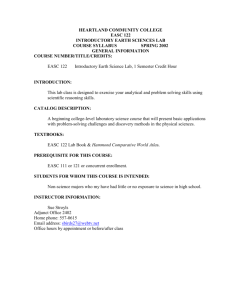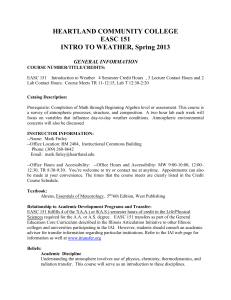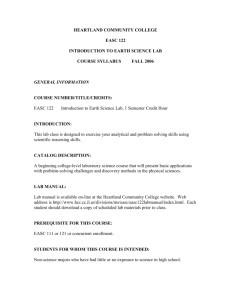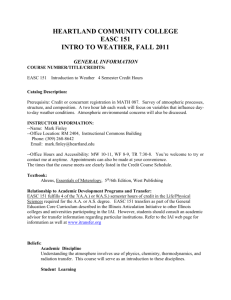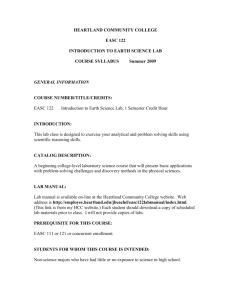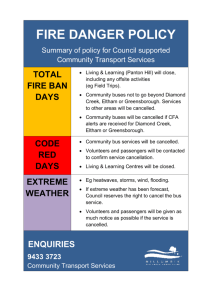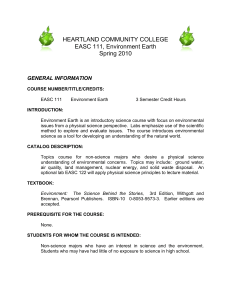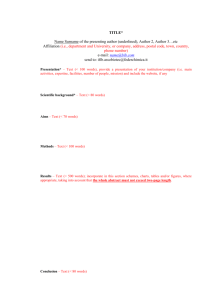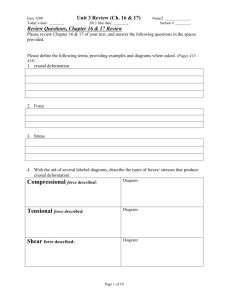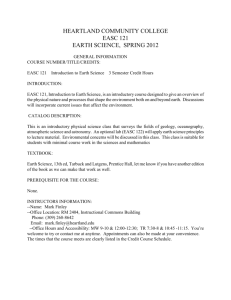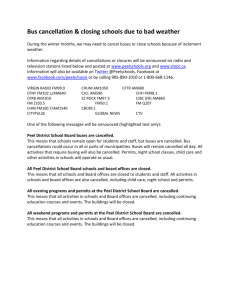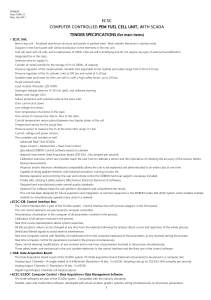EASC 122 Finley - Heartland Community College
advertisement
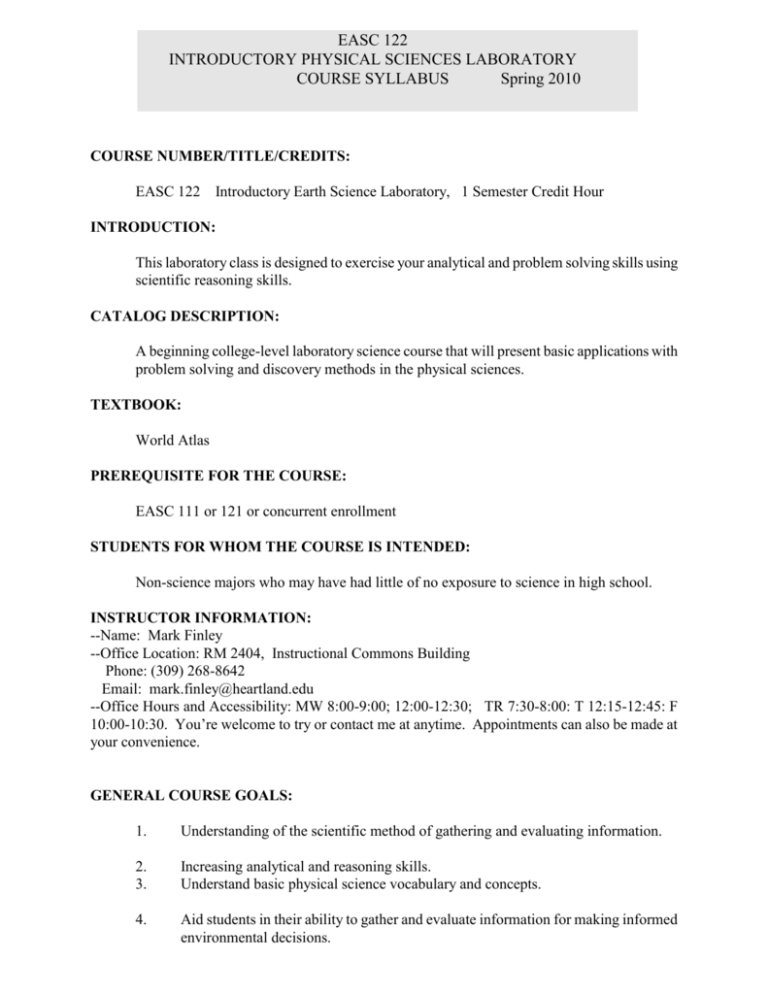
EASC 122 INTRODUCTORY PHYSICAL SCIENCES LABORATORY COURSE SYLLABUS Spring 2010 COURSE NUMBER/TITLE/CREDITS: EASC 122 Introductory Earth Science Laboratory, 1 Semester Credit Hour INTRODUCTION: This laboratory class is designed to exercise your analytical and problem solving skills using scientific reasoning skills. CATALOG DESCRIPTION: A beginning college-level laboratory science course that will present basic applications with problem solving and discovery methods in the physical sciences. TEXTBOOK: World Atlas PREREQUISITE FOR THE COURSE: EASC 111 or 121 or concurrent enrollment STUDENTS FOR WHOM THE COURSE IS INTENDED: Non-science majors who may have had little of no exposure to science in high school. INSTRUCTOR INFORMATION: --Name: Mark Finley --Office Location: RM 2404, Instructional Commons Building Phone: (309) 268-8642 Email: mark.finley@heartland.edu --Office Hours and Accessibility: MW 8:00-9:00; 12:00-12:30; TR 7:30-8:00: T 12:15-12:45: F 10:00-10:30. You’re welcome to try or contact me at anytime. Appointments can also be made at your convenience. GENERAL COURSE GOALS: 1. Understanding of the scientific method of gathering and evaluating information. 2. 3. Increasing analytical and reasoning skills. Understand basic physical science vocabulary and concepts. 4. Aid students in their ability to gather and evaluate information for making informed environmental decisions. RELATIONSHIP OF COURSE TO STUDENT ACADEMIC DEVELOPMENT: EASC 122 provides a basic science laboratory foundation necessary for further college-level courses. RELATIONSHIP OF COURSE TO GENERAL EDUCATIONAL REQUIREMENTS: This class will fulfill lab science credit in the A.A. and A.S. degree requirements. EDUCATIONAL BELIEFS BELIEFS ABOUT STUDENT LEARNING: Students must take an active role in the learning process or it will not take place. Desire and effort are the key ingredients in your success. BELIEFS ABOUT TEACHER'S ROLE: I am responsible for fostering an atmosphere conducive to learning, always keeping in mind that the ultimate objective is to develop student interest and transfer knowledge. CONTENT OUTLINE TOPIC OUTLINE FOR THE COURSE: 1. 2. 3. 4. 5. 6. 7. 8. 9. Units: Metric and English Scientific Method Density Maps Earth Materials/Rocks and Soils Groundwater/Hydrologic Cycle Contamination Atmospheric Measurement Urban Ecology RATIONALE FOR COURSE CONTENT: Course content covers science fundamentals and basic laboratory techniques necessary for more advanced science courses. Topics in the lab will increase environmental awareness. DESCRIPTION OF INSTRUCTIONAL TECHNIQUES AND RATIONALE: Discussions and laboratory work. Students will have the opportunity to ask questions and contribute to discussion throughout. DESCRIPTION OF LEARNING FORMAT: Following these steps will assist the student in achieving success: A. B. C. D. Attend lab sessions regularly. Participate in class discussions. Your ideas and thoughts are important. Ask questions when you don't understand or need something clarified. It's a smart idea to take an active role in the learning process. Take the time to do careful, thoughtful work that you are proud of. FEEDBACK AND GRADING GRADING SYSTEM/METHOD OF EVALUATION: Scale: >90% A, 89-80 B, 79-70 C, 69-60 D, <60 F. Two lab practicals are planned (60pts). You will be allowed to drop your lowest lab score. No makeup labs or tests will be given. If you miss a lab that will be the lab that you drop. POLICIES ON ASSIGNMENTS/TESTS/MAKEUPS: No make-ups for labs, tests or quizzes. You can drop your lowest lab score, if you miss a lab that is the lab you can drop. Sound advice: Save your lab miss for an unexpected occurrence. Labs are due at the start of the following lab period. POLICIES ON ATTENDANCE: Regular class attendance is an important part of educational success and is expected of all students. If you don't attend you won't be able to complete your lab. No make-ups. Notice of Cancelled Class Sessions Cancelled class sessions, for all HCC classes, will be listed under Cancelled Class Meetings in the A-Z Index and under Academic Information in the Current Students page on the HCC Web site. Go to http://www.heartland.edu/classCancellations/ to learn what classes have been cancelled for that day and the upcoming week. Be sure to check the last column, which might contain a message from the instructor. SUPPORT SERVICES LIBRARY POLICIES: Students may use Milner Library at Illinois State University. LEARNING-ASSISTANCE POLICIES: If additional assistance is necessary outside of class, please contact me as soon as possible. My office hours are listed in the General Information section. You may also call ahead of time for a scheduled appointment. Tutoring can also be arranged through Student Services. CURRICULAR AND TRANSFER STATUS DEGREE/CERTIFICATE: This course counts towards completion of the A.A. Degree or the A.S. Degree. TRANSFERABILITY: See academic advisor STUDENT ASSIGNMENTS AND PURPOSE RELATIONSHIP OF COURSE GOALS TO ASSIGNMENTS: Each assignment provides background needed to achieve the course goals. CALENDAR There will be 15 class meetings this semester. The tentative lab schedule is as follows: SIGNIFICANT DATES: 18 Jan 8-13Mar 5 May Martin Luther King Day MidTerm Break Last Day of Class (16 Week) Lab Topics subject to change per notice. Topic Units/Scientific Notation/ Dimensional Analysis Scientific Method Density Maps Practical Earth Materials/Rocks/Soils Groundwater/Hydrologic Cycle Contamination Atmosphere Practical Class meetings 1-2 3-4 5 6-8 9 10-12 13 14 15 16 ** YOU SHOULD BRING A CALCULATOR AND PENCIL TO CLASS.
